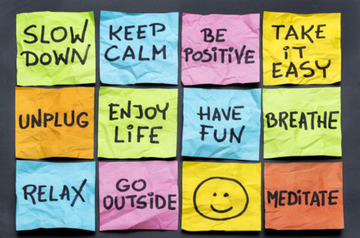Too Busy For Self-care? Think Again!
Be honest now. What was your reaction when you first read the title of this post? Chances are you rolled your eyes in indignation (seriously woman who has the time?) or shifted uncomfortably in your seat. Been there, done that with two growing children, a home to run, activities to attend, bills to pay and a 9-hour work day. Until I discovered a lump in my breast! Fortunately for me, it turned out to be a harmless cyst, but nonetheless, I was shaken awake enough to take a good look at my life. So, if you’ve been feeling guilty or too busy to take time off for your own self-care, stick with me as I present my case. I get the good feeling that I am about to change your mind!
Here’s WHAT!
Life can be challenging and we can’t always control all the bad stuff that comes our way. Constant stress wears us down by releasing excessive amounts of the hormone Cortisol. Some amount of the hormone is always present in our body, but large amounts of it floating in the blood stream can cause long term detrimental effects. But to understand a little bit of how that mechanism works, we must first understand what stress really is.
Neurobiology of stress
Canadian endocrinologist Hans Selye was the first to present his findings on the impact of stress way back in the 1950s. In a nutshell, Selye proposed that continuous exposure to stress inducing events causes neurological exhaustion to set in. In simple terms, it means that in the face of ongoing stress the brain mechanisms involved begin to recover more and more slowly until it finally shuts down completely. In lay terms, this process is commonly known as “burnout”. It’s a state of mind characterized by mental and physical exhaustion. Behind the scenes of this manifested exhaustion are incredibly complex processes involving multiple brain structures such as the thalamus, the hypothalamus (an almond size structure under the thalamus and above the brain stem) & the brain stem. When an individual is faced with a stress inducing situation, this triggers an amazing set of chemical exchanges between these three structures that allows the body to respond to the stressor, almost like an orchestra in performance! The end result, is the release of the hormone cortisol. The right amount of cortisol is a good thing, giving you the much needed burst of energy in the morning and can in-fact enhance productivity and immunity. However, when our senses are constantly battered with ongoing stress, the brain mechanisms that manage these processes go into overdrive. The body takes longer and longer to return to rest state until eventually it remains in a constant state of hyper-arousal leading to huge repercussions. An interesting point to note here is that the body responds to both real AND perceived threat in the same manner. So, the more stress you face or perceive you are facing, the more amount of Cortisol is maintained in your blood stream at high levels. And this can be very harmful.
And WHY?
Much like a badly tuned instrument in an orchestra, excessive hormones in our blood stream can cause havoc.
The long term physical impacts of stress:- In older woman, excessive cortisol can cause variety of physical problems including thyroid imbalances, osteoporosis, weight gain and high blood pressure. It can also reduce immunity making your body more susceptible to illnesses such as cancer and have an impact on the transition to menopause. In younger women, excessive stress has been known to cause infertility and an impaired cognitive performance such as reducing the ability to take decisions effectively. For more information click here http://www.avogel.co.uk/health/stress-anxiety-low-mood/stress/the-impact-of-stress-on-womens-health-part-3).
Mental and emotional impacts of stress: Psycho-neuro-immunologists (fancy term for scientists who study the interplay of brain processes on immune responses and psychological processes) have revealed that that chronic stress can lead or exacerbate mental illnesses such as depression, bipolar disorders, personality changes and problem behaviours. Habitual patterns of negative thoughts induced by these illnesses may influence self-worth and self-efficacy making a person feel incapable of managing stress. This in turns increases the likelihood of a mental illnesses triggered by such stress creating a vicious cycle for which long term medical treatment and psychotherapy are possible options of help. To learn more about the interactions between stress and mental illnesses click here https://www.mentalhelp.net/articles/mental-and-emotional-impact-of-stress .
Hopefully the above information has made a favourable argument for self-care. That said, I recognize that self-care is a touchy subject. Although things have changed a lot over the years, taking time from our busy lives as mums, home-makers, wives and career-women, can still be viewed as being selfish and indulgent. And yet, taking care of ourselves not only makes us more functional and resilient, it also contributes to us being more emotionally receptive to those around us. Deliberate self-care routines will not only help you stay motivated and committed to face the demands of your own life but also put you in the mental space you need to celebrate the lives of those around you. Self-care does not have to be hard or take up a lot of your time. A few minutes carved into your everyday day routine to nurture yourself can put you in the best possible physical and mental state to keep functioning well.
Time to put yourself first, ditch the guilt and show up in the world the way you were meant to be! In my next post, we will explore small steps you can take to transform your life in awesome ways. If you simply can’t wait until next week, get a sneak peak into mindful self-care strategies at https://www.facebook.com/amindfulmama
References: https://www.journals.elsevier.com/neurobiology-of-stress












